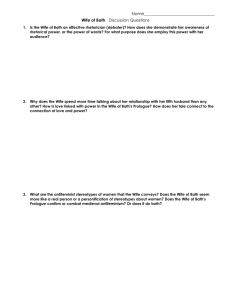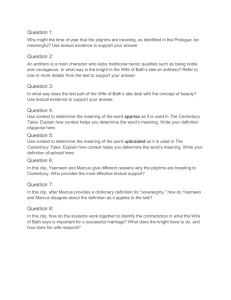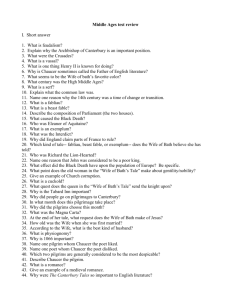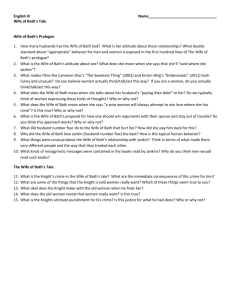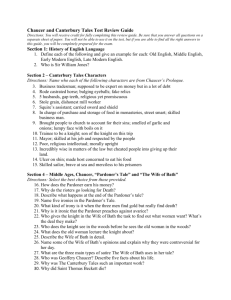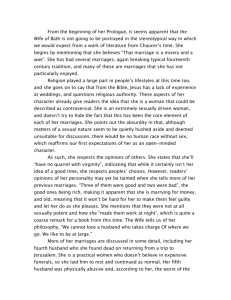Catherine Chaton
advertisement
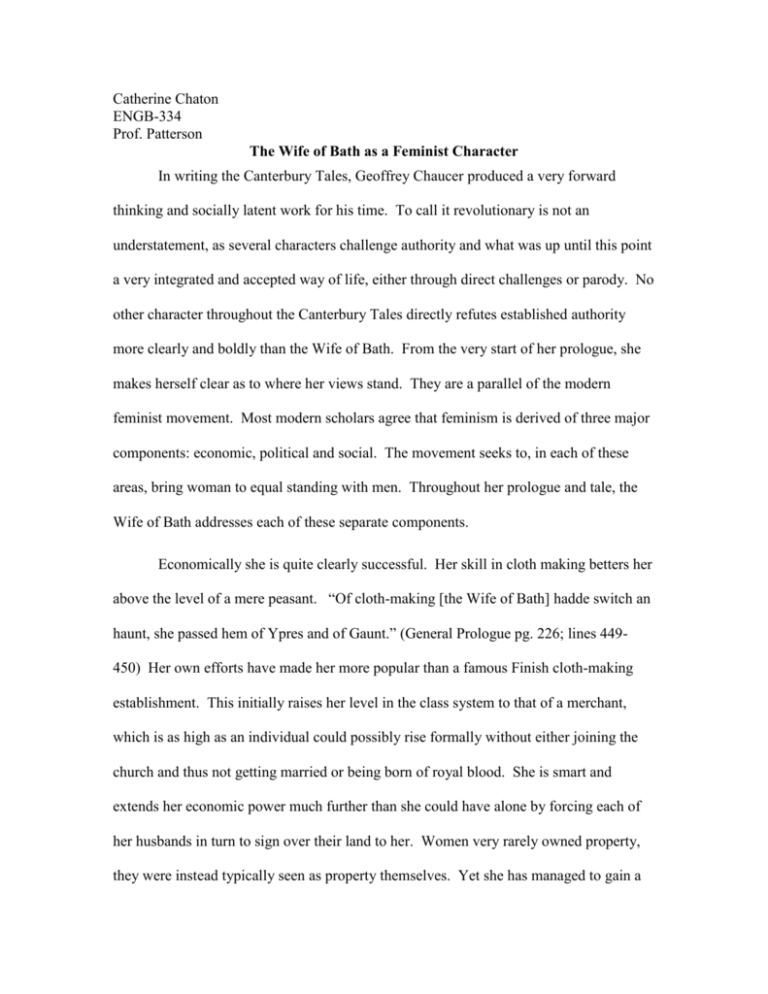
Catherine Chaton ENGB-334 Prof. Patterson The Wife of Bath as a Feminist Character In writing the Canterbury Tales, Geoffrey Chaucer produced a very forward thinking and socially latent work for his time. To call it revolutionary is not an understatement, as several characters challenge authority and what was up until this point a very integrated and accepted way of life, either through direct challenges or parody. No other character throughout the Canterbury Tales directly refutes established authority more clearly and boldly than the Wife of Bath. From the very start of her prologue, she makes herself clear as to where her views stand. They are a parallel of the modern feminist movement. Most modern scholars agree that feminism is derived of three major components: economic, political and social. The movement seeks to, in each of these areas, bring woman to equal standing with men. Throughout her prologue and tale, the Wife of Bath addresses each of these separate components. Economically she is quite clearly successful. Her skill in cloth making betters her above the level of a mere peasant. “Of cloth-making [the Wife of Bath] hadde switch an haunt, she passed hem of Ypres and of Gaunt.” (General Prologue pg. 226; lines 449450) Her own efforts have made her more popular than a famous Finish cloth-making establishment. This initially raises her level in the class system to that of a merchant, which is as high as an individual could possibly rise formally without either joining the church and thus not getting married or being born of royal blood. She is smart and extends her economic power much further than she could have alone by forcing each of her husbands in turn to sign over their land to her. Women very rarely owned property, they were instead typically seen as property themselves. Yet she has managed to gain a substantial amount of gold and land by marrying wealthy powerful older husbands. “But sith I hadde hem hoolly in myn hand, and sith that they hadde yiven me al hir land, what shoulde I take keep hem for to plese, but it were for my profit and myn ese?” (Wife of Bath’s Prologue pg. 258; lines 217-220) It is also interesting to note that in this case she is gaining power over both society and her husbands by praying on their weakness, which is the need for sex. Only after her economic welfare is secure does she allow her own sexual appetite to take control, something obviously these men could not do. Politics at the time this pilgrimage is taking place were heavily wrapped up with the church. While not a traditional sense of politics as known today, the Wife of Bath’s defense and justification of her actions through church doctrine is as extremely political move. Her mock sermon in the prologue is an attempt to change, at least on a small scale, religious views and thus affect what is politically right and wrong. She aspires to change the view of sexual experience. For a man it is nothing but an accepted way of life, but a woman’s worth and purity is bound with her virginity. Quite honestly this is an unrealistic perspective as the Wife of Bath points out, all these virgins that scholars expect must come from somewhere. Therefore for every woman worth something (that is to say, as much as a woman could be worth) there must be a whole line of sinners and undesirables behind her. “And certes, if there were no seed sowe, virginitee, thane wherof sholde it growe?” (Wife of Bath Prologue pg. 225; lines 77-78) John, unlike many of these recent religious figures, never commanded that a woman must remain a virgin her whole life, a point that the Wife of Bath makes. Her sermon demonstrates that she is a free thinker and does not simply follow what she is told from authority, creating the conditions necessary for her to challenge the church in the first place. A bit later in the prologue she makes a similar case, defending this time that experience equates to usefulness as she compares virginity to a golden cup and the experienced woman to a wooden one. While gold might be the ideal, it serves very little functional purpose, just as a virgin does, not only in procreation but also in advancing the position of women. It is important to note that during her prologue, the Pardoner and the Friar, interrupt her twice. Not only did she attack what would be the heart of the anti-feminist establishment, but she has also elicited responses, proving that they are in the very least considering what she has said. The Pardoner takes her so seriously that he at first gives up his hopes of being married. “Up setrte the Pardoner and that anon: ‘Now dame,’ quod he, ‘by God and by Saint John, ye ben a noble prechour in this cas. I was aboute to wedde a wif: allas, what sholde I bye it on my flesh so dere? Yit hadde I levere wedde no wif toyere.” (Wife of Bath’s Prologue pg. 257; lines 169-174) The social aspect of equality would defiantly be the most beneficial battle to fight and win for any feminist. What better place to make the change than in one’s own life. It is quite clear from both her story and her past that she has effectively made these changes to her ideology and daily existance. Four of her five husbands she managed to dominate totally, and the fifth she reached equality with in the end while still maintaining financial control. Her ideology reflects this clearly during her tale as a Knight, who forcibly takes control from a woman by raping, is punished in the form of being placed at the fate of several others. The Queen and her court whom originally spare him are ultimately the ones that judge his answer and will be the deciders of whether he lives or dies. The unnamed knight is also at the mercy of the many women he questions attempting to seek the answer to the question. Finally he is placed in his most subservient position with the crone who ultimately saves his life only to entrap him again with his promise. And what else should be decided upon as what all women want but “sorereinetee as wel over hir housbonde as hir love, and for to be in maistrye him above?” (Wife of Bath’s Tale pg.276; lines 1044-1046) Control or sovereignty in this case is not simple dominance for the sake of control, but also implicative of the woman’s opinions and values being worth as much or more than the man’s. For a husband to be under a woman’s control means that she is valued as a thinker and partner and not simply malicious. No better is this idea illustrated in the text than at the ending of the Wife of Bath’s tale when the Knight finally gives in to the plight he is placed in by the woman he is forced to marry. He let’s her decide because he truly believes that she will be able to make the best choice for them both. “My lady and my love, and wif so dere, I putte me in yore wise governaunce: cheseth youreself which may be most pleasaunce and most honour to you and me also. I do no fors the wheither of the two, for as you liketh in suffiseth me.” (Wife of Bath’s Tale pg. 280; lines 1236-1241) The complexity of the Wife of Bath’s views is quite clear, one only needs to look at the size of her prologue, which is double that of her tale. Of the characters that have a prologue and tale, she is by far the most lengthy one, and for good reason. Such a theory as this simply didn’t exist in Chaucer’s time. Therefore it took much more physical space to both justify and enumerate her character and her views. And while Chaucer might have done this is a slightly satirical light, the Wife of Bath overall comes across as a character that is both well thought out, organized and highly educated for a woman in her times, a sort of revolutionary figure. While it is true the Wife of Bath might focus on the major aspects of feminism, some might argue that she does not engender the spirit of it. From a modern perspective that is quite possible as feminism itself has had at least three major radical changes through it’s existence. It was reconstructed and reformulated into taking a different stance on whether or not it was proper to simply advocate unbounded women’s rights or to only go so far as to say women should be equal to men. Current philosophy believes mainly in the latter, which the Wife of Bath clearly does not. But one must adjust their views to fit in a different sort of time frame than modern America and look to exactly what life was like back then before one can fully understand her position and possible frustrations with society. The twelfth and thirteenth centuries were a time of a strong class system. An individual’s position within that hierarchy determined not only their position within everyday life, but also one’s distance from God. The concept of total equality would have been unknown to the Wife of Bath at the time or to Chaucer. Typically one must advance by knocking another down within the hierarchy. Therefore why should women, considered to be born of sin and automatically less perfect than men, not seek dominance? It is made quite clear that the Wife of Bath is very forward thinking in the areas of both her rights as a woman and her wants. Surely, any realistic character placed in this life situation would not only attempt to make themselves equal but at the same time prove that they are by presenting an irrefutable example to society. That being domination. Note the Wife’s resolve in her beliefs. The travelers are engaged in what is essentially a social contest, struggling against one another for the esteem and cooperation of their fellow pilgrims. Many of the other tales are either meant to be entertaining, such as the Miller’s tale, or try to show a deep meaning to attempt to prove the depth of character that the speaker has. Yet the Wife of Bath tells views and a tale which would go completely against popularity. She would almost certainly be dooming her chance at winning the contest no matter how true her words are. Her only real attempt to counter for this is the ending of her tale. Allowing the Knight to live without further punishment goes to help soften the blow of her message somewhat. Just imagine for a moment what would have happened to her had she instead killed the Knight or doomed him to live out some horrible consequence. Would it have been justified? Yes, but not popular. The Wife of Bath displays all the major elements of feminist philosophy. Even in a time when such a theory didn’t even exist, Chaucer had the insight in society to roughly approximate modern feminism within a completely different societal framework. While it’s true not every aspect transfers perfectly across boundaries, it is clear to say that the Wife of Bath is interested in the advancement of the female gender and that she embodies the basic spirit of the movement. It is truly amazing that a character such as this could have emerged from a world so masculine in nature.
